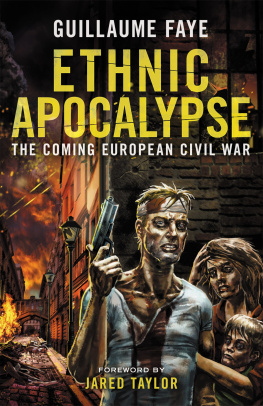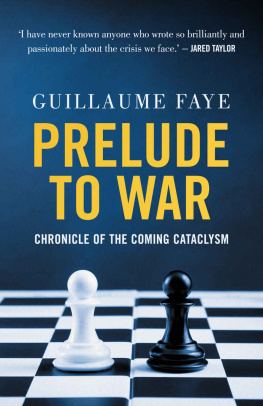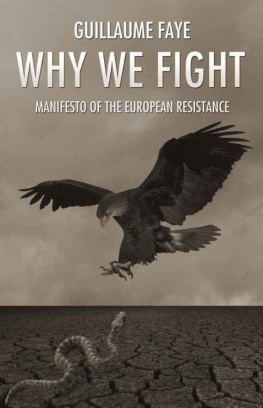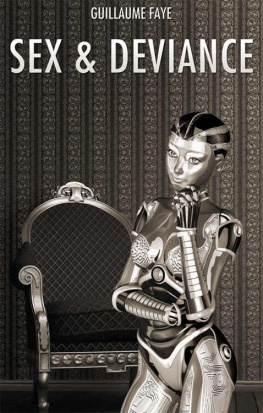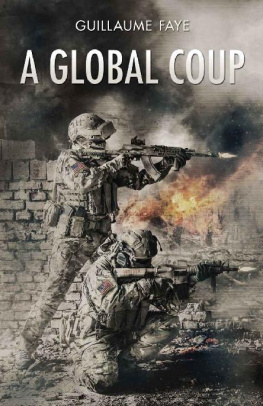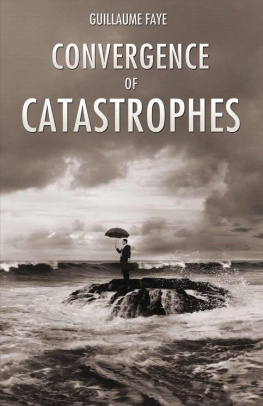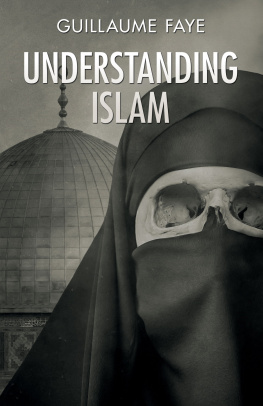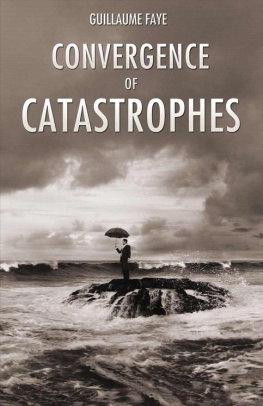
Arktos
London 2019

Copyright 2019 by Arktos Media Ltd.
All rights reserved. No part of this book may be reproduced or utilised in any form or by any means (whether electronic or mechanical), including photocopying, recording or by any information storage and retrieval system, without permission in writing from the publisher.
Arktos.com | Facebook | Twitter | Instagram | Gab.ai | Minds.com | YouTube
ISBN
978-1-912975-33-4 (Softcover)
978-1-912975-34-1 (Hardback)
978-1-912975-35-8 (Ebook)
Translation
Roger Adwan
Editing
John Bruce Leonard
Layout
Tor Westman
Cover
Illustration by Pensel Fjorton
Preface by Jared Taylor
Because I speak French, it has been my great good fortune to become acquainted with some of the major figures in the French nationalist movement. I have the deepest respect for these men and women who are fighting for their people, but the Frenchman who most deeply impressed me from the very first meeting was Guillaume Faye.
I well remember the occasion. It was in 2003. I had an introduction to Faye from a mutual friend, and we met in a small restaurant.
At that timeand it is true even nowmany patriotic Frenchmen hesitated to use the word that I think essential to understanding the crisis France faces: the word race. But after an hour with Faye, I found myself thinking: This guy understands the problem perfectlymaybe even better than I do. And he has a clear perspective on what must be donemaybe clearer than my own. I was struck by the power of his mind, his passion for truth, and his love for his people. It was the beginning of a friendship that has lasted for more than fifteen years.
Living as we do on different continents, Faye and I have not seen each other nearly often enough, but I invited him twice to speak at the American Renaissance conferences that I organize. Each time, he charmed his listeners with his French accent and moved them with his eloquence and insight. And for me, every trip to France naturally included long conversations with Faye.
Gradually, thanks to the efforts of Arktos Media, this great philosopher of the crisis of the West has become better known to English speakers. Words such as archeofuturism, ethno-masochism, and xenophilia are now well known to those of us who keep abreast of events in Europe. Guillaume Faye is now among the very best-known spokesmen for the survival of our people.
The book you now hold in your hands is certainly the darkest, bravest, and frankest book my friend has ever written. It is a brilliant analysis of the mortal threat to us of massive non-white immigration. I cite the following ominous passage that justifies the books title:
There are three possibilities concerning the sequence of events.
The first, the worst of them all, would be that of submission . It takes two to wage a war, and if our white Frenchmen do not defend themselves against these invaders and foreign aggressors, there will be no war. What will result instead is decay, collapse without real combat or isolated acts of revenge. This is a possibility which I cannot exclude.
The second possibility, a terrible, distressing and unthinkable one at that, is the outbreak of a racial civil war resulting in the defeat of French natives and other ethnic Europeans, who would have to fight against their own collaborationist state. This is a development mentioned particularly by Jean Raspail.
The third possibility is that of a victorious civil war with incalculable historical consequences, including, of course, the collapse of all our political paradigms. Whatever the case, we will find it impossible to evade major disorders in the coming years. Indeed, Western Europe will soon be the setting for an inevitable earthquake.
This is pure Guillaume Faye. While others fail to grasp the extent of the problemor even the form or nature of the problemFaye cuts straight to the fateful choices we face: submission, defeat, or victory. He writes that there is no other choice because a convivial living-together is only possible when it involves populations that are biologically and culturally related. Anything else is but a sham. We do not wish to live with these people. Period.
There actually is a fourth possibility, which is voluntary, peaceful separation. There are a few modern examples: the dismemberment of the Soviet Union and the separation of the Czechs from the Slovaks. In the former Yugoslavia, separation was mostly violent, but Slovenia was born virtually without bloodshed.
In all these cases, however, there was a crucial difference from that of France: These nations were (re)established in territories that had been historically populated by distinct peoples. In France, an alien population with a ruthless will to power and united by a triumphalist religion threatens the native population, and the entire country is at stake. Peaceful separation is hard to imagine.
And, of course, as Faye writes so clearly, France is not the only white nation in peril. All of Western Europe as well as the overseas nations built by Europeans face the same crisis of dispossessionand for the same reasons. The capitulationist spirit of the French that Faye describes with such penetration applies word for word to the ruling and media elites everywhere from Germany to Canada to New Zealand. Only those nations that were sheltered by what we used to call the iron curtain have escapedat least for the time beingthe effects of ethno-masochist poisons. This apparent determination of the white man to bring about his own destruction is without precedent in the history of our species, and no one describes it better than Guillaume Faye.
One of the three choices this book outlines for France is submission. I cannot imagine a more miserable or ignoble fate for a nation that has contributed countless treasures to our civilization. And yet, for the reasons that Faye explains both with sadness and with fury, such a fate is not unthinkable. A similarly contemptible collapse is likewise possible in my own country. If our people awaken and build for themselves a future as glorious as our past, it will be thanks to the efforts of brilliant, tireless men such as Guillaume Faye.
I am grateful and deeply honored that my friend of fifteen years has dedicated this book to me. I also rejoice in his having jointly dedicated the book to my comrade Sam Dickson, who has been Guillaumes friend and co-combatant for more than four decades. Sam Dickson has faithfully and courageously fought the forces that would transform the West and he admires France and its people as deeply as I do.
He joins me in this message to the readers of this book: Frenchmen and Americanswe are the same people. Your struggle is our struggle!
Jared Taylor
A Brief Note from the Publisher
The original French title of this book, as the reader will learn from the Introduction, is intentionally incendiary: Guerre Civile Raciale , or Racial Civil War . We have elected to change this title in the English edition, in consideration of the unjustified, and in our opinion, unjustifiable digital censorship that has recently afflicted too many unorthodox writers. It is evident that the original title would render this book a magnet to our contemporary censors, who would work under the curious pretext, no doubt, that any book which speaks of a racial civil war in its title must surely be advocating the same. Then let us declare unequivocally that neither Guillaume Faye, nor his French publisher, nor Arktos, in any way relishes the prospect of any kind of war on European soil. Faye himself describes this outcome as but one of several possibilities open to Europe. As for Arktos, we condone no gratuitous violence, and have never ceased decrying the unnecessary military interventions waged even now by Western powers across the globe.
Next page
